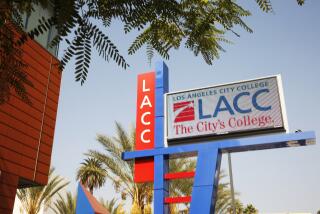Small Sacrifices Here Helped Half a World Away
- Share via
Her goal was modest . . . $100, more or less, was all it would take to restore sight to a person in rural Kenya who had gone blind.
Maybe, figured teacher Donna Judd, her students in Fullerton could raise that much--enough to pay for cataract surgery for a rural villager half a world away.
Never mind that her kids at Ladera Vista Junior High aren’t rich. In fact, some of their families lack medical insurance, and one-quarter have family incomes so low they qualify for free lunches at school.
“Still, I thought about the message it would send,” Judd said. “For as much as we spend on a pair of shoes, we could give someone the gift of sight.”
*
It felt to Judd like a perfect matchup of local interests and global needs.
Her seventh-grade language-arts class was reading “The Miracle Worker,” studying the life of Helen Keller, and contemplating the challenges of being deaf and blind. In social studies, they were learning about Africa.
Then Judd came upon a newspaper article about a mobile eye clinic, sponsored by Lions Clubs International, that travels to rural villages in Kenya, performing vision-saving surgeries.
About 15,000 Kenyans--many from rural villages without health care--are blinded by cataracts each year, even though the condition is easily treated with a $110 operation that takes 15 minutes to perform.
“And it struck me reading that,” Judd said, “that I could skip the Nordstrom’s sale and give someone their sight back instead.
“And then I thought about my students and how empowering it would be for a 12-year-old to know that they’ve changed someone’s life in such a profound way.” Reading about Helen Keller had an enormous impact on her students, said Judd, who bolstered the lesson with an out-of-school exercise: Each child was required to spend two hours pretending to be blind and deaf.
The kids covered their eyes, stuffed cotton in their ears and tried to make it through their normal routines: eating supper, doing chores, running errands, even skateboarding.
“They talked about it later . . . about feeling scared, bored, frustrated,” Judd said. “And the thought of having to go through life like this really hit home for some of them.”
So when Judd told them about the program in Kenya, they jumped at the chance to contribute enough to fund a surgery. Then Judd added this carrot: If her classes raised enough to help one patient, she would match it, providing surgery for two.
The money began dribbling, then pouring, in. One girl gave the $20 her grandmother had given her as a birthday present. Some students skipped lunch and donated their lunch money. Others turned over their allowances.
When they reached $110, Judd doubled it. But her students were not ready to stop. They decided to take the project school-wide, designing posters, penning speeches, drawing up fliers to pass out in every class.
“I thought maybe we’d make it up to three people”--the equivalent of $330, said seventh-grader Denise Corona. “But once people realized what we were doing, I guess they started thinking about how lucky we are . . . that we can see and hear.”
Said her classmate Jillian Day: “I don’t think any of us thought we could raise this much at first. But so many people wanted to participate . . . students, teachers, the people in the office. By the time we finished, we had $678.”
*
It hit home for 12-year-old Nancy Dougherty when she tied on a blindfold and set out with a friend to walk to the nearest grocery store. The mile-long trek “was pretty scary,” she said. “I felt so helpless. I had to rely on my friend because there was so much I couldn’t do for myself.”
That helplessness can sabotage a family in rural Kenya, says Rukiya Mohamedali, 22, a classroom aide at Ladera Vista, who was born and raised in Kenya.
“Most of these people live in rural villages and require their eyesight to perform the tasks needed to farm the land, to support their children and grandchildren,” she explained. “If they can’t see, everybody suffers.”
Growing up in Mombasa, she often visited the rural eye clinics with her father, who was active with the local Lions Club. “It was a wonderful experience for me, as a child, to be able to see the difference [the surgeries] made.”
Through her parents, who live in Bakersfield and have ties to the Lions Clubs in Kenya, Mohamedali will send the money to the clinics.
And there, $678 in missed school lunches, skipped clearance sales, donated birthday gifts and allowance contributions will translate, for six blind strangers, into eyes that, once again, can see.
Sandy Banks’ column is published on Sundays and Tuesdays. Her e-mail address is sandy.banks@latimes.com.
More to Read
Sign up for Essential California
The most important California stories and recommendations in your inbox every morning.
You may occasionally receive promotional content from the Los Angeles Times.













